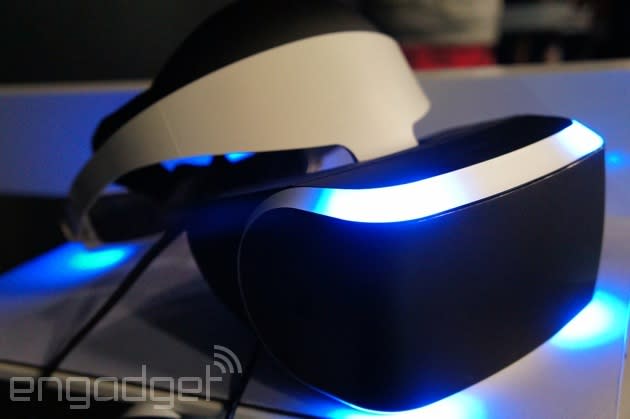Exploring virtual reality on PlayStation 4 with Shuhei Yoshida and Richard Marks (video)

It was 2010 when Sony engineers first explored virtual reality concepts. The idea of a VR headset sprang from another project at the company: PlayStation Move, a wand-like motion controller for the PlayStation 3. Company engineers attached the controller to head-mounted displays, enabling a form of homemade VR via motion and depth tracking. Sony Computer Entertainment Worldwide Studios head Shuhei Yoshida was asked to try these early prototypes, one which put the player into the role of Kratos in God of War 3 and the other a mod of Half-Life 2 where you could lift up and look at your own gun. "That was a totally compelling experience, so I became a believer," Yoshida told us in an interview this week, post-Project Morpheus announcement. "It was a 'wow' moment!"
So, what's Project Morpheus? It's the somewhat silly code name (from the Greek God of Dreams) for the virtual reality headset planned for the PlayStation 4, and Sony unveiled it this week during the 2014 Game Developers Conference in San Francisco. Yoshida himself announced Morpheus, flanked by R&D engineers Richard Marks and Anton Mikhailov who dug into the technical chops behind the prototype headset. The trio chose GDC for an important reason: this is where they can send a rallying cry to game developers. Marks made their call to action clear when he finished his portion of the presentation by saying that this moment, right now, is the beginning of a new field of gaming. "This is the Wild West," he said. And he's right. There are no VR standards (though efforts are being made), no VR game "tropes" yet. The folks making VR games are at the forefront of an unexplored genre, and that's thrilling.
Morpheus is as close to the quality of Oculus VR's latest Rift prototype as anything out there, though it lags behind a bit in a few key areas. Specifically, vision blur, field of view and image quality aren't as refined as the Rift's latest dev kit (read our full hands-on here). Nor is Morpheus up to Sony's standards for the consumer version. Marks acknowledged as much in our interview (seen above), and he also spoke to the hurdles ahead for VR as a medium going mainstream.
As ever, with VR it's about making a product that'll convince people. But what about that whole "putting electronics on your head" issue? That "encumbrance" factor is a concern, Marks admitted -- one that Sony's trying to minimize with the design of the headset, but only so much can be done with existing technology that keeps it within a reasonable consumer price range.
Whereas Oculus has put a firm price on its Dev Kit 2, Sony's not talking cost for this first iteration of Morpheus, and that same silence extends to its particular specs, and eventual consumer release. The prototypes/development kits at GDC are the base level of workable hardware for developers to start developing games. Yoshida's hoping we'll see some of the fruits of those developers' labor by E3 this June -- Morpheus dev kits head out to game developers next month, and the only way to get one currently is to get in touch with Sony directly (Yoshida suggested tweeting at Adam Boyes and Shahid Kamal Ahmad).

Morpheus will inevitably evolve towards a final consumer version. It's just not coming this year -- and that's the closest thing to a release window we've got right now. But we expect Project Morpheus won't remain so mysterious for too long.
Photos and video: Michael Gorman, Edgar Alvarez and Nicole Lee.





















